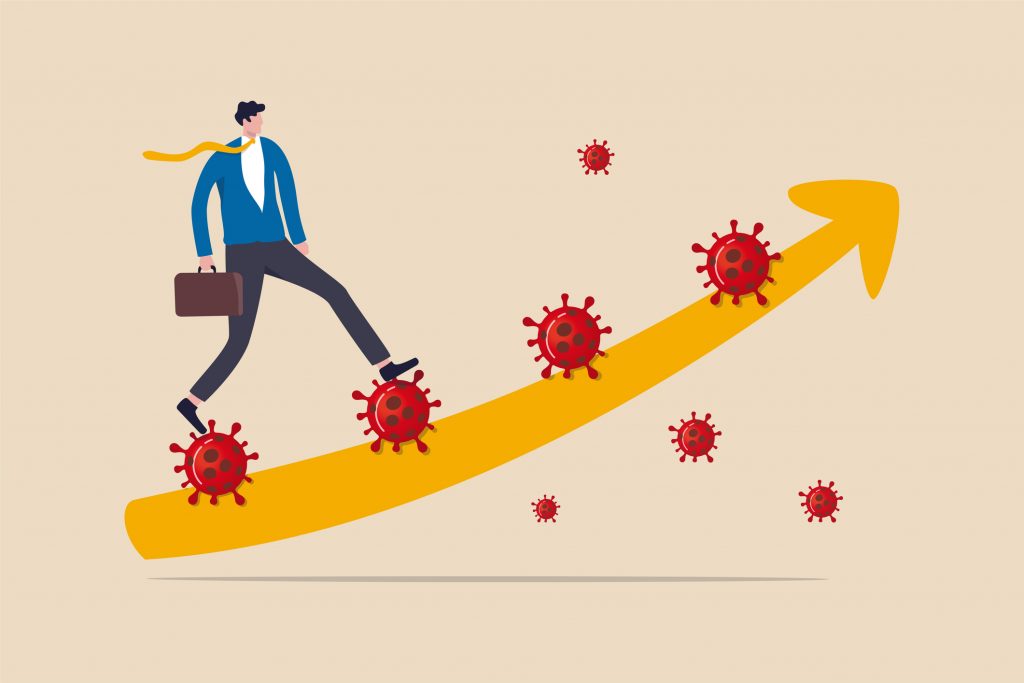We need more progressive taxation, and a wealth tax, to pay for the COVID-19 rescue packages
14 September 2020
The cost of COVID-19 rescue packages will likely be partly financed by increased inflation, which will disproportionally affect less-affluent people and workers, including frontline NHS staff.
Dr Wojtek Paczos and Dr Paweł Bukowski (London School of Economics) argue that to spread that burden more equitably, governments should consider an increase in progressivity of income taxes and an introduction of a temporary wealth tax.
The return of inflation?
The COVID-19 crisis has resurrected the debate on inflation. There are good reasons to believe that it might return soon. First, the lockdown measures induced sharp contractions in both aggregate supply and aggregate demand. Although both harm production and employment, they have opposing effects on prices – demand contractions reduce, while supply contractions increase inflation. These effects are unbalanced across the sectors of the economy. The fall in the measured inflation in April and May 2020 was mainly driven by deflation in transport and clothing and a slowdown in the housing sector. This is unprecedented and likely temporary since transport and housing sectors were the largest contributors to the Consumer Prices Index including owner occupiers’ housing costs (CPIH) inflation over the past ten years. At the same time, measured inflation in food and recreation and culture increased (ONS, June 2020).
Additionally, the lockdown measures induced large changes in the composition of the consumption basket. Some items are simply unavailable to purchase – almost 15% of a typical CPIH basket (ONS, May 2020), but some although still available (petrol) are purchased considerably less. Thus, Dixon (May 2020) argues that in the UK the official CPIH index is likely underestimating the true inflation.
Second, massive fiscal interventions in the UK and the rest of the world alike rely on national (and union-wide) central banks providing additional emergency liquidity. In the UK, this has even taken the form of the direct monetary financing of the government by the Bank of England. If successful, the fiscal intervention will mechanically increase the amount of money in circulation. The demand, however, cannot increase in tandem due to the lockdown measures. This, according to the quantitative theory of money, will lead to higher inflation: “When stocks and inventories run low, the price system will match the dampened quantities and stimulated spending in the usual way. Prices will rise.” (Baldwin, March 2020).
Third, when the lockdown is lifted, the demand will recover. Goodhart and Pradhan (March 2020) argue that since this will happen following a period of massive fiscal and monetary rescue packages, it may lead to a surge in inflation of more than 5%. Roach (May 2020) suggest that this may be exacerbated by the disruptions of global supply chains and the return of off-shored manufacturing. If this becomes the “new normal”, it will mean higher costs of production and higher prices for final products.
We may thus expect that a successful fiscal intervention will eventually lead to an increase in inflation, if not now, then during the economic recovery. This will be good news – stable or falling prices would be a sign that the fiscal policy has not used its full potential.
Who pays the inflation tax?

Inflation, regardless of whether it will be accurately reflected in the CPIH or not, is as a form of wealth and income tax. It reduces the value of savings and wages in consumption units. Thus, the rescue package can be viewed as a redistribution tool: a transfer to the crisis-hit parts of the economy paid for by inflation and future taxes.
Inflation is not as an egalitarian tax, as it may seem. It mostly affects three overlapping groups. The first group are the workers whose wages do not rise as fast as inflation. Those include key-workers from the public sector (nurses, doctors, first responders, teachers), whose nominal wages have been essentially frozen since 2010 due to austerity measures (Dolton 2017). Unless inflation is counterbalanced with the rise in the minimum wage, low- and mid-skilled occupations from the private sector will also be affected. This is hardly a new phenomenon – since 2007 the real median wage in the UK has contracted by 3%, the largest fall in Europe after Greece (Costa and Machin 2019). The record-low levels of unionization (Farber et al. 2018) and very weak bargaining power of workers (Bell et al. 2018) suggest that this phenomenon will continue also after the COVID-19 crisis.
The impact of inflation depends depending on the composition of the consumption basket. Households that consume goods and services with stickier prices, such as tuitions, childcare or luxury products, are relatively shielded from the general rise of prices. The recent research on US households shows that those are mostly high-income people (Cravino et al. 2020). On the other hand, the middle class is more exposed to inflation as their spending increases relatively more when inflation strikes.
Finally, inflation matters more for people who mostly keep their savings in regular bank accounts. These offer historically low nominal interest rates and do not shield savers against inflation. Those are mostly from low and middle classes. Affluent people possess relatively more real estate and business properties, as well as financial products, returns on which have historically over-compensated for inflation (Crowe 2005, Piketty 2020).
Thus, inflation is a regressive wealth and income tax – the lower the income the higher proportion of it is taxed away by inflation. This burden also disproportionately falls on frontline workers. What can be done to spread the cost of rescue packages more equitably?
Progressive income and wealth taxes

We propose a two-fold solution. First, to shield frontline staff against inflation, their wages should be increased. This should be a part of a wider package of boosting spending on the NHS. The coronavirus crisis has proved, that healthcare should not be treated as an expenditure, but as an investment. An investment that could have saved the economy.
Second, those new expenditures, as well as the new public debt that is financing the rescue packages, could be partly paid off with a new progressive tax levied on those, who survived the crisis relatively unscathed. This could take the form of a wealth tax on the net worth of the top 1% richest individuals. Landais, Saez and Zucman (April 2020) put forward a proposal of an EU-wide temporary progressive wealth tax with three rates: 1% of net worth above €2m (£1.75m), 2% above £8m (€7m) and 3% above €1bn (£870m). They estimate that this new tax would pay off the new debt of a size of 10% of GDP after 10 years.
This solution has two key advantages. Since the wealth of the most-affluent is also in substantial parts liquid, nobody will be required to sell illiquid assets (eg. their house) to pay the tax. For instance, securities and cash constitute more than 40% of the gross capital value of estates with a net value above £1 million (ONS 2019). Secondly, a wealth tax is a tax on the past, rather than the future streams of income. It does not distort consumption, savings, labour supply or investment decisions. Such temporary wealth taxes were introduced in many countries after the World Wars, for example, Germany, Japan, and Poland. The UK almost introduced a permanent wealth tax during Labour governments of Harold Wilson and James Callaghan in 1974-1976.
Milton Friedman famously said that there is no such thing as a free lunch. Rescue packages are a necessary policy tool in the current crisis, but they do not come for free. It will be costly to save the economy and those costs, sooner or later, will have to be paid off in the form of increased taxes. The equitable spreading of this burden in the future is as important as the details of the rescue packages today. Without it, the costs will disproportionately fall onto those, who already are paying the highest price today.
Dr Wojtek Paczos is a macroeconomist and lecturer at Cardiff Business School and at the Institute of Economic Sciences of the Polish Academy of Sciences.
Dr Paweł Bukowski is a researcher and lecturer at the Centre for Economic Performance, London School of Economics and Political Science and at the Institute of Economic Sciences of the Polish Academy of Sciences.
This article was originally published on the LSE COVID-19 blog.
- March 2024
- April 2023
- August 2022
- July 2022
- April 2022
- March 2022
- February 2022
- December 2021
- October 2021
- September 2021
- May 2021
- April 2021
- March 2021
- February 2021
- January 2021
- December 2020
- November 2020
- October 2020
- September 2020
- August 2020
- July 2020
- June 2020
- May 2020
- April 2020
- March 2020
- February 2020
- January 2020
- November 2019
- October 2019
- September 2019
- August 2019
- July 2019
- June 2019
- May 2019
- April 2019
- March 2019
- February 2019
- January 2019
- December 2018
- November 2018
- October 2018
- September 2018